Lumiere by Jacqueline Garlick
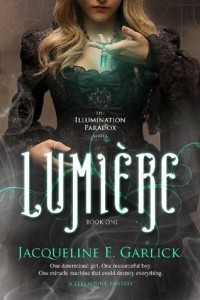 Summary: Plagued by mental fits that could cause her to be committed, Eyelet finds herself all alone after her father dies the Night of the Great Illumination and her mother is executed for being deemed a valkyrie. Before his death, Eyelet’s father was working on a machine to cure her affliction that he called the Illuminator, and Eyelet’s quest to find it causes her introduction to Urlick, a young man afflicted with his own demons. Together, Eyelet and Urlick embark on a journey to find her father’s journals and make the machine work in a quest for healing, but the true power of the machine proves to be darker than they could have ever imagined.
Summary: Plagued by mental fits that could cause her to be committed, Eyelet finds herself all alone after her father dies the Night of the Great Illumination and her mother is executed for being deemed a valkyrie. Before his death, Eyelet’s father was working on a machine to cure her affliction that he called the Illuminator, and Eyelet’s quest to find it causes her introduction to Urlick, a young man afflicted with his own demons. Together, Eyelet and Urlick embark on a journey to find her father’s journals and make the machine work in a quest for healing, but the true power of the machine proves to be darker than they could have ever imagined.
Number of Pages: 335
Age Range: 13-15
Review: An epic steampunk adventure, Lumière by Jacqueline Garlick is the story of Eyelet, an eighteen year-old girl who has spent ten years living in a world where the sun doesn’t shine anymore. Because of the Night of the Great Illumination, cloud cover is pervasive, forcing residents of the Commonwealth to living in often foggy conditions, terrorized by the vapour that has the ability to alter a person’s DNA.
Eyelet is an outsider who lives in fear that someone will find out about her fits and send her away. Since she was a little girl her hope has been being cured by her father’s Illumination machine, but when he dies before he can cure her, Eyelet seeks the machine out herself.
Urlick also knows what is like to be an outsider. Stuck in the birth canal during his birth, his prolonged entrance into the world kills his mother and earns his father’s disdain. On top of that Urlick is feared as a monster at times thanks to his red eyes, albino-like appearance and port-wine stains on his skin.
Both Eyelet and Urlick are spirited characters, sensitive to the needs of others because of their personal afflictions. When Eyelet goes after her father’s Illuminator machine and finds Urlick packing it into the back of his carriage, she insists on accompanying him whether he likes it or not. But what begins as an antagonistic relationship soon turns into respect, friendship and then love. While the machine and the desire for healing initially brings them together, they quickly realise how much they have in common.
I have a lot of favourites in this book: Bertie the cycle, loyal Iris, and all of Urlick’s neat, multi-purpose inventions. I was intrigued by the family secrets, and the highly mechanised world Eyelet and Urlick live in, as well as the Illuminator’s dark downside. Even though Eyelet’s father created the machine to cure Eyelet, the realisation that it actually made her worse must have been heart-breaking. What I liked best about Lumière though was that it was just a great story, action-packed and entertaining.
The only problem I had with it was when Eyelet and Urlick are caught in her father’s study by Smrt, the bad guy, and in the next chapter they have suddenly escaped his clutches without an explanation of how they did so. I actually flipped back a few pages and checked the chapter numbering to make sure I hadn’t missed a chapter, thinking my copy may have been defective. But it wasn’t. The explanation does come in spurts, but Garlick definitely has the writing chops to have fleshed it out as a chapter in itself.
As a first young adult book, it’s a good start, and I look forward to seeing where Garlick takes the series.
Addendum: Turns out that my e-copy of Lumière was in fact missing an essential scene. And as I predicted, Garlick had the considerable skill to write her characters out of their desperate situation while revealing several key plot points. I have to admit that after I read the missing section, the story made a lot more sense, although when I read it yesterday I was just willing to give Garlick the benefit of the doubt because some of the aspects revealed in the scene I had figured out on my own. Now that I know it is a complete and vibrant story though, I will be adjusting my rating on Goodreads. Thanks for sending me the missing section Jacqueline!
Memorable Quotes:
“The Illuminator.
The one he invented solely for me. To try and put an end to this madness that plagues me. To save me from a life locked up in an asylum.
The one he sold.
Before he bothered to fix me.
Then died – and left me here.
Still defective.
To fight this demon – all alone.
The smoke in my mind turns from grey to black, the world around me erasing…slowly…
I wish you’d never invented it.
Never sought a solution –
Never let me believe there was hope…
I wish I’d never been born defective –
I wish I’d never been born at all…
I wish I could reverse everything –
Everything, that’s happened…” – Eyelet from Lumière by Jaqueline Garlick
“He strokes my hair and kisses the top of my head, and I feel as though a weight has been lifted off my heart – an anchor I’ve carried since birth. I cling to him, letting the years of heartache melt away, his hands stroking my back. How many years had I believed I would never be loved, never accepted, all because I was different? And now, our differences have brought us together.” – Eyelet from Lumière by Jacqueline Garlick
Lumière by Jacqueline Garlick is published by Amazemo Books, (2013).
A Troublesome Boy by Paul Vasey
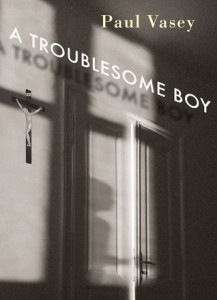 Summary: Labelled a troublesome boy by his old school, Teddy’s mother’s boyfriend decides to send him to St. Iggy’s, a Catholic boys boarding school. Once there he makes friends and gets along well with his classmates, but the priests and brothers who run the school often abuse their power through the use of physical discipline and intimidation. When one of the priests begins using Teddy’s friend Cooper for sexual favours, Teddy feels powerless to stop what becomes Cooper’s gradual descent into depression and hopelessness. The one good part of their lives comes in the form of Rozey, the school’s handyman, who befriends them both and acts as a friend and father figure. After tragedy strikes, Teddy seeks to avenge Cooper by holding the priests he feels are responsible accountable, only to find their protection is more pervasive than he ever could have imagined.
Summary: Labelled a troublesome boy by his old school, Teddy’s mother’s boyfriend decides to send him to St. Iggy’s, a Catholic boys boarding school. Once there he makes friends and gets along well with his classmates, but the priests and brothers who run the school often abuse their power through the use of physical discipline and intimidation. When one of the priests begins using Teddy’s friend Cooper for sexual favours, Teddy feels powerless to stop what becomes Cooper’s gradual descent into depression and hopelessness. The one good part of their lives comes in the form of Rozey, the school’s handyman, who befriends them both and acts as a friend and father figure. After tragedy strikes, Teddy seeks to avenge Cooper by holding the priests he feels are responsible accountable, only to find their protection is more pervasive than he ever could have imagined.
Number of Pages: 225
Age Range: 15-17
Review: I can’t write that I love A Troublesome Boy by Paul Vasey because I don’t. It’s a painful read dealing with serious and mature subjects featuring adult abuses of power in positions of trust.
But while Vassey’s book is gritty, the reason why it is such a painful read is because his characters are well-drawn and relatable. He hooks his readers into the story, and they become witnesses to Father Prince preying on Cooper’s vulnerable and sensitive nature. What hurt me most as a reader was how Father Prince used Cooper’s quest for love and acceptance against him, gaining his trust and becoming his confidant only to turn it into something sordid.
Even though Teddy’s efforts for getting justice are futile, I was glad he continually questioned his surroundings. Being a troublesome boy may have been an undesirable trait to his educators, but it ultimately saved him from sharing Cooper’s fate. The character growth in Vasey’s book is thoughtful, and I did love his exploration of the difference between being defeated and destroyed through Teddy and Cooper’s stories.
The first time I read Vasey’s book, I questioned the ending. Teddy’s father seems to appear from nowhere, and after years of no communication with his son suddenly they are ready to ride off into the sunset together. He apologizes and everything is fine between them. The second time, however, I appreciated it. I realised that by being expelled from school and picked up by his dad, he got the happy ending Cooper would never get. He had a place to belong and people that loved him, and thankfully because of that he would not end up like Cooper. My heart broke for Cooper, but that realisation helped me to not completely fall apart after finishing the story. It was a kindness on Vasey’s part, easing the ending of the book just a bit.
But I wish things could have been different. Those days Cooper and Teddy had with Rozey were some of the happiest they’d ever had, and I just wanted Rozey, the only genuine, reliable, and responsible adult in their lives to adopt them and take them home. In that sense, Teddy’s father picking him up isn’t so far-fetched after all.
Memorable Quotes:
“‘What though the radiance which was once so bright
Be bow forever taken from my sight,
Though nothing can bring back the hour
Of splendour in the grass, of glory in the flower;
We will grieve not, rather find
Strength in what remains behind . . . ‘” – quote by Wordsworth from A Troublesome Boy by Paul Vasey, page 74
“I wondered if vanishing fathers ever stopped for a minute before they dropped their drawers and jumped into bed with their new girlfriends and thought about how they were totally screwing the lives of everyone they were leaving behind. I had a hard time imagining that my old man ever gave me a second thought. But there wasn’t a day went by that I didn’t wish I could see him. And there wasn’t a day that I didn’t think how much I’d love to kill him as soon as I laid eyes on him.” – Teddy from A Troublesome Boy by Paul Vasey, pages 104-105
“‘You didn’t deserve it.’
‘So why all the shit raining down on my head? Some kids wind up in nice families. You and me, we wind up in St. Iggy’s? What is it, luck of the draw?’
‘I guess.’
“Well, I wish they’d reshuffle the deck. Let me pick another card.'” – Conversation between Teddy and Cooper from A Troublesome Boy by Paul Vasey, page 106
“‘Ever wonder why they’re such bad-tempered old men?’ said Klemski.
‘You’d be bad tempered if you had to swear off women and booze and poker and they made you walk around in wool robes all the time,’ I said. ‘Makes you wonder why they signed up in the first place.’
‘My mom says a lot of them signed up when they were kids. Seventeen, eighteen,’ said Klemski. ‘Before they knew any better. And it was a big deal to have a priest in the family.'” – Conversation between Klemski and Teddy about priests from A Troublesome Boy by Paul Vasey, pages 181-182
“Brother Joe looked at me. He nodded. ‘Maybe that is the main point,’ he said. ‘To live your life on your own terms, right to the end. Perhaps it’s the fight that matters, not the prize.’
‘So you can die and still win?’
‘Yes,’ said Bro Joe. ‘We’re all going to die. That’s not what’s important. What’s important is how we live.'” – Conversation between Brother Joe and Teddy from A Troublesome Boy by Paul Vasey, page 184
A Troublesome Boy by Paul Vasey is published by Groundwood Books, (2012).
Tales From the Farm by Jeff Lemire
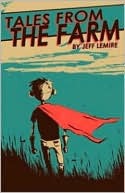 Summary: Living with his Uncle Ken after his mother dies, 10 year-old Lester is just trying to stay afloat. The relationship between Lester and his uncle is strained as they can’t quite seem to connect through their grief, but a new friendship with Jimmy helps Lester see things in a new light. Jimmy himself is a former Maple Leafs’ player whose career was cut short when a injury caused brain damage. Like a kid himself, Jimmy is the perfect companion for Lester, and allows him to be the hero his mother always thought he was.
Summary: Living with his Uncle Ken after his mother dies, 10 year-old Lester is just trying to stay afloat. The relationship between Lester and his uncle is strained as they can’t quite seem to connect through their grief, but a new friendship with Jimmy helps Lester see things in a new light. Jimmy himself is a former Maple Leafs’ player whose career was cut short when a injury caused brain damage. Like a kid himself, Jimmy is the perfect companion for Lester, and allows him to be the hero his mother always thought he was.
Number of Pages: 104
Age Range: 13-15
Review: There is a lot of heart packed into Tales From the Farm by Jeff Lemire. Managing to convey great depth in sparse yet expressive illustrations, Lemire shows Lester’s journey through grief to an understanding with his Uncle Ken as he reflections on his mother’s illness and death. It’s a quick read, but memorable and touching as the pictures tell most of the story.
I loved rural Ontario setting, and Lemire’s gentle and genuine characters. Though Lester is only 10 years old, his story will be enjoyed by teens and adults.
Essex Country Vol. 1: Tales From the Farm by Jeff Lemire is published by Top Shelf Productions, (2007).
Big Big Sky by Kristyn Dunnion
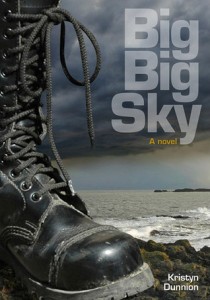 Summary: Belonging to a pod made up of teen girls, Shona, Rustle, Solomon, Roku and Loo work together to carry out missions assigned to them by the ScanMans. But when two of their members start going through physiological changes and one of them goes missing, the ScanMans try to bring them all in for reprogramming. In their escape the pod is confronted with the wider world outside what they’ve been told, and the metamorphosis of Rustle and Roku changes them forever. Seeking answers and trying to survive, the separation of the pod causes each member to follow their own journey, questioning anew everything they’ve been trained to believe.
Summary: Belonging to a pod made up of teen girls, Shona, Rustle, Solomon, Roku and Loo work together to carry out missions assigned to them by the ScanMans. But when two of their members start going through physiological changes and one of them goes missing, the ScanMans try to bring them all in for reprogramming. In their escape the pod is confronted with the wider world outside what they’ve been told, and the metamorphosis of Rustle and Roku changes them forever. Seeking answers and trying to survive, the separation of the pod causes each member to follow their own journey, questioning anew everything they’ve been trained to believe.
Number of Pages: 244
Age Range: 15-17
Review: One of the most intriguing pieces of speculative fiction I’ve read, Big Big Sky by Kristyn Dunnion creates a world where men and women are highly segregated. Teams or pods of young women are used to maintain order amongst themselves and root out the rogue communities of women that have escaped from pod life. Still, it is men who are in charge, pulling all of the strings it seems, trading women as slaves between their communities for favours.
In the midst of this sordid world, Dunnion presents her reader with one pod of girls. This pod demonstrates that perhaps those in charge don’t have everything figured out after all, as two of the girls are evolving characteristics of other species. The disappearance of Roku means they are all summoned to the lab for genetic testing, but as a group they manage to escape a certain death sentence.
Right from the start I was hooked by Dunnion’s creation. She effectively uses language to develop her characters, creating words and expressions to highlight the reality of the girls’ world. It isn’t the easiest read as a result, but it is well worth the effort.
While I loved getting to read from different perspectives of members in the pod, my favourite was Rustle. Despite becoming part girl, part fish, she strives to love and survive, sustained by memories of Loo when they are separated. When her changes allow her to get Loo pregnant, I was so happy for them because they genuinely cared about each other. Indeed, when Loo figures out her baby is Rustle’s, that knowledge is what really connects her to her child because she loves her baby’s mother.
I found it to be a bit of an emotional read because I just wanted things to work out for all of the girls and I wanted to cry when bad things happened to them. I loved their connection to each other, being able to send emotions, thoughts and texts to each other through their bodies. I wondered but wasn’t sure if they were able to do that because they were female, or because they had been wired that way, but liked that it created such a feeling of community for them.
After read Dunnion’s work I find myself pondering what it really means to be a girl, the power of friendship and love as well as the basic need to have a firm grasp on reality instead of being a mindless follower of propaganda. Each of the girls experiences a powerful journey that reveals truth, but often times the truth is more terrible than the lie.
Unless you’ve read Dunnion’s book, the memorable quotes section probably won’t make much sense except to give you a taste of what Dunnion has done through her writing. But if you’re a fan of speculative fiction and ready for an immersive reading experience, then Big Big Sky is the book for you.
Memorable Quotes:
“Shona and I look at each other in silence. I see the tired misery of a failed Leader. Someone who hungered for what little recognition ScanMans ever doled out. Just as I hungered medallions and pins, hunting trophies, and high scores on Mission. How Roku hungered truth stories, and Solomon harmony and healing. How Rustle hungered me. When I look at Shona, I see that we chose a poisoned meal, both of us, and that now we had to live out our last millis knowing our mistake.” – Loo from Big Big Sky by Kristyn Dunnion, pages 85-86
“Later, alone again, I think of Loo. I want to rememory my favourite fusion stories. I want to conjure her curled up and playing with my hair – though now it’s brittle and falling out from all the medipacs they inject in me. I try to smell her, try to rememory the essence that is Loo, but I can’t. The only smells I have are my own excrete, my own rejected soup, and the dank must of this underground lair. ScanMans have their own smells: chemclouds, antiseptic, burning flesh, and plastic gloves. All mixed with the taste of my own blood.
I roll over, stare at the other cell wall. I count the cracks that waver up and out until my vision blurs. I blank. At least I can still do that.” – Rustle from Big Big Sky by Kristyn Dunnion, page 174
“Dronebeets know their poison, though. They thrill with my every small advance, boast one against the next, and even place wee bets on how I might progress. Against my better judgement, I begin to breathe more deeply. I begin to sit and then to stand, begin to stretch and work on relearning these flailing parts of mine; that relentless survivalist program, subwired so deep that even ScanMans themselves cannot burn it from my mangled core.” – Rustle from Big Big Sky by Kristyn Dunnion, page 214
Big Big Sky by Kristyn Dunnion is published by Red Deer Press, (2008).
Getting a Life by Jocelyn Shipley
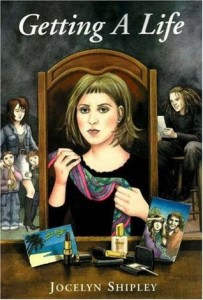 Summary: When her best friend Tanya moves to Australia for a year and doesn’t write, Carly is understandably upset. Missing Tanya but also her best friend’s family, Carly is surprised when the letter she finally receives tells her to get a life of her own and to stop trying to bogart Tanya’s mother. New neighbours distract Carly from the hurt she feels, as she finds herself offering to babysit the children of a single and neglectful mother. The experience brings up memories of her own mother who was institutionalized and died in a car accident, and Carly slowly starts to unravel her past as well as her true feelings about her childhood. With new self-awareness, Carly is able to go forward and take chances to be the person she wants to be.
Summary: When her best friend Tanya moves to Australia for a year and doesn’t write, Carly is understandably upset. Missing Tanya but also her best friend’s family, Carly is surprised when the letter she finally receives tells her to get a life of her own and to stop trying to bogart Tanya’s mother. New neighbours distract Carly from the hurt she feels, as she finds herself offering to babysit the children of a single and neglectful mother. The experience brings up memories of her own mother who was institutionalized and died in a car accident, and Carly slowly starts to unravel her past as well as her true feelings about her childhood. With new self-awareness, Carly is able to go forward and take chances to be the person she wants to be.
Number of Pages: 223
Age Range: 14-16
Review: In Getting a Life by Jocelyn Shipley, Carly finds herself dealing with the death of her mother by attaching to Sally, her best friend Tanya’s mother. Sally is everything Carly imagines a good mother would be, and though she has limited memories of her own mother before she was institutionalized and died, she’s still left with a sense of wanting.
But this wanting is influenced by the fact that the friends in Carly’s life aren’t true friends. Though Tanya is away for a year in Australia, she writes Carly to tell her to get a life, and stop trying to take Sally’s attention. Hurt, Carly becomes friends with Dawn, a new neighbour, a friendship fuelled by Dawn’s need for free childcare, and Carly’s need to feel needed. It turns out to be yet another relationship where Carly is being used, only she doesn’t see it at first.
All is not lost though because Carly learns from her experiences. When she finds out her boyfriend, Andrew, is only dating her to make Tanya jealous, it takes her some time but she realises being with him is not worth her time. As the book progresses she remembers more about her mother, using her memories to fuel more conversations with her father about what life with her mother was actually like. Bleaker than she imagined, the truth is actually freeing as her self-awareness grows.
Throughout it all she takes care of Dawn’s younger sisters, Amber and Skye. Carly proves to be a loving caregiver and quickly grows to care for them. Faced with having to make a difficult decision about their well-being, Carly finds herself in a similar situation as her grandmother was when Carly’s mother had postpartum depression. Her choice changes things for the girls, but her journey along the way ends up giving her the life Tanya suggested she get, empowering Carly to fall in love and take chances.
I liked Shipley’s skilled character growth as Carly turns into a self-aware young woman who endeavours to make the best choices she can. When I realised Dawn and Andrew were using her, I was upset because although she may have been a bit obsessive with Tanya’s mother, she deserved more leeway and understanding than she got. Of course she was looking for connection to replace her missing mother/daughter relationship, especially because she was also dealing with distant family members.
The one part that did confuse me was Dawn’s ‘good’ father. He was mysterious, seeming to care about all of the girls even though he was only Dawn’s father, but still remote enough that he didn’t seem to realise how neglected the girls actually were. I wanted to know more about him, because ultimately I wasn’t sure living with him was going to solve the family’s problems.
By the end of Shipley’s book I had a great deal of empathy for Carly, and I was happy she finally had genuine people in her life to confide in and care about.
Memorable Quotes:
“‘Yeah,’ I say, ‘I do.’ After all, I’m supposed to be getting a life. And I want it to be my life, not Tanya’s or Dawn’s or Andrew’s.” – Carly from Getting a Life by Jocelyn Shipley, page 182
“But I’ll remember them forever.
I lie on my bed and think about that. How some people are part of your life for just a short time, but you know they’ll stay with you long after they’re gone. They’ll haunt you.
Dawn and Amber and Skye.
My mother.” – Carly from Getting a Life by Jocelyn Shipley, page 222
Getting a Life by Jocelyn Shipley is published by Sumach Press, (2002).
Haunted by Barbara Haworth-Attard
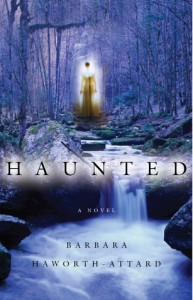 Summary: Dee (short for Defiance) lives with her midwife grandmother in small town Ontario just after World War I has ended. Gifted with a second sight that involves seeing ghosts, Dee becomes involved in a murder investigation when the bones of a good friend are discovered on Price’s Mountain. Evil is haunting the town as more girls die, but Dee is the only one who can see it. Working against the growing suspicion of the townspeople, Dee tries to unravel the mystery of who is committing the murders, but when an obviously innocent man is arrested, Dee must step up her efforts. In the process she learns terrible truths about her absent mother, and the father she has never known.
Summary: Dee (short for Defiance) lives with her midwife grandmother in small town Ontario just after World War I has ended. Gifted with a second sight that involves seeing ghosts, Dee becomes involved in a murder investigation when the bones of a good friend are discovered on Price’s Mountain. Evil is haunting the town as more girls die, but Dee is the only one who can see it. Working against the growing suspicion of the townspeople, Dee tries to unravel the mystery of who is committing the murders, but when an obviously innocent man is arrested, Dee must step up her efforts. In the process she learns terrible truths about her absent mother, and the father she has never known.
Number of Pages: 273
Age Range: 13-15
Review: Barbara Haworth-Attard is a beautiful writer. I love how she makes the landscape of her book, Haunted, come alive with vivid descriptions and exquisite, vibrant word choices. It’s the perfect backdrop for equally vibrant and strong-willed characters Defiance and Gran, granddaughter and grandmother locked in a somewhat contentious relationship further aggravated by the absence of Defiance’s mother.
Gran is a holder of secrets and a believer in the old ways of doing things. A midwife who has delivered many of the townspeople, she is adjusting to the turn toward modern medicine and women preferring to have their babies delivered by doctors. Able to see the future at times, she uses her gift to help those she cares for.
Defiance has dreams of being a nurse, though her grandmother would prefer for her to be a midwife as well. She is a comforting presence to those in her Gran’s care, but because of their special gifts of having the second sight they seem to be targets whenever something goes wrong in the community.
Haunted is a well-paced, suspenseful mystery with paranormal elements, and clues that reveal who the killer is as well as other plot twists if the reader is willing to decipher them. But it’s also more than that. Reading Haworth-Attard’s book was like stepping into a community of people with complex motivations and relationships, just trying to do their best after the horrors of war and an influenza outbreak. Still, my favourite part was the development of Defiance and Gran’s relationship, and how they go from being related to being family.
As you can see from the memorable quotes that I chose, Clarence was my favourite character. He provided great insight to the experience of war and I felt that he and Defiance would have made a good match for each other.
It was a smooth, page-turning read that I thoroughly enjoyed.
Memorable Quotes:
“Morning mist blotted out the blaze of yellowed oaks and reddened maples on the lower slopes, though crimson patches appeared here and there where the sun’s warm rays had poked holes in the white curtain.” – from Haunted by Barbara Haworth-Attard, page 4
“‘That’s good of him. There’s not much work around for those soldiers coming home,’ Clarence said. The blue of his eyes deepened with anger. ‘People seem to resent the fact we came back at all. They resent that soldiers need jobs and help. I saw a newspaper the other day that called the war ‘an international unpleasantness.’ I guess that makes it easier for people. It’s easier to think someone lost a leg in an international unpleasantness rather than in a war. You don’t owe that someone quite so much when it’s an unpleasantness.; He spat out his bitterness.” – Clarence from Haunted by Barbara Haworth-Attard, page 88
“Clarence sat silent for a moment, his hands hanging between his knees, head bent. ‘Do you know who the wounded and the dying call for?’
Dee shook her head.
‘Their mothers. We were just boys over there. Playing at being men, yet when we were hurt or dying, we wanted out mothers. And the real men, the grown ones, the officers who planned the battles? They sat safe in their tents or their offices, behind the lines, and ordered those boys over the top to be gunned down. Those men didn’t see the death. They didn’t hear the boys crying for their mothers, so they just kept sending us out. Maybe if they’d heard . . .'” – Clarence from Haunted by Barbara Haworth-Attard, page 130
“He paused, and then said, ‘I wasn’t one of those, Dee. I wasn’t one of those who liked to kill. I had to in order to survive, but I didn’t like it. I’d get ill afterward. With each life I took, a little bit of me died, too, but I took comfort in that. I even welcomed those small deaths of mine. At least it let me know that I was still a decent person.’ Clarence shook his head and looked away.” – Clarence from Haunted by Barbara Haworth-Attard, page 174
Haunted by Barbara Haworth-Attard is published by HarperTrophy Canada, (2009).




 Amy Mathers has been passionate about reading from a very young age, and hopes others will share her enthusiasm for funding a teen book award.
Amy Mathers has been passionate about reading from a very young age, and hopes others will share her enthusiasm for funding a teen book award. 





